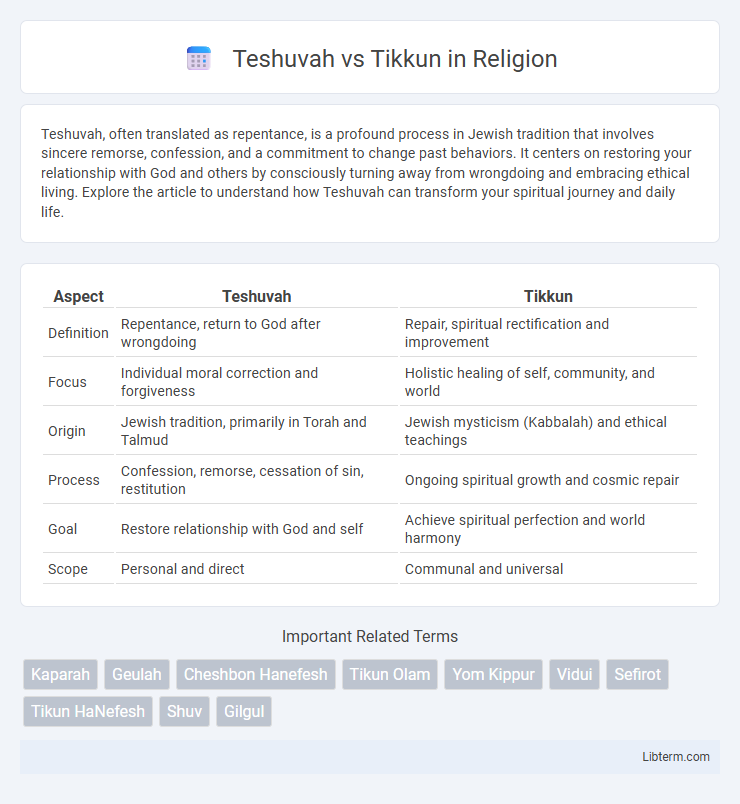Teshuvah, often translated as repentance, is a profound process in Jewish tradition that involves sincere remorse, confession, and a commitment to change past behaviors. It centers on restoring your relationship with God and others by consciously turning away from wrongdoing and embracing ethical living. Explore the article to understand how Teshuvah can transform your spiritual journey and daily life.
Table of Comparison
| Aspect | Teshuvah | Tikkun |
|---|---|---|
| Definition | Repentance, return to God after wrongdoing | Repair, spiritual rectification and improvement |
| Focus | Individual moral correction and forgiveness | Holistic healing of self, community, and world |
| Origin | Jewish tradition, primarily in Torah and Talmud | Jewish mysticism (Kabbalah) and ethical teachings |
| Process | Confession, remorse, cessation of sin, restitution | Ongoing spiritual growth and cosmic repair |
| Goal | Restore relationship with God and self | Achieve spiritual perfection and world harmony |
| Scope | Personal and direct | Communal and universal |
Understanding Teshuvah: The Path of Return
Teshuvah, often translated as "repentance," represents a profound spiritual process of returning to one's true self and reconnecting with the divine after a transgression. It involves sincere regret, confession, and a commitment to change behavior, emphasizing inner transformation over mere external correction. Unlike Tikkun, which means "rectification" or "repair" and often refers to broader cosmic or societal healing, Teshuvah focuses primarily on personal moral restoration and ethical realignment within the Jewish spiritual framework.
Defining Tikkun: The Mission of Repair
Tikkun refers to the spiritual and ethical mission of repairing and restoring both the individual soul and the wider world, emphasizing proactive transformation and healing. Rooted in Jewish mystical tradition, Tikkun encompasses acts of social justice, personal growth, and communal responsibility aimed at rectifying brokenness and restoring harmony. It extends beyond Teshuvah, which centers on repentance, by focusing on continuous improvement and repairing all forms of spiritual and material damage.
Historical Origins of Teshuvah and Tikkun
Teshuvah, rooted in ancient Hebrew scriptures, originally emphasized repentance as a return to God and restoration of moral integrity, with foundational texts found in the Torah and prophetic writings. Tikkun, evolving later in Jewish mysticism and Kabbalah, embodies spiritual rectification and cosmic repair, particularly detailed in Lurianic Kabbalah teachings of the 16th century. The historical origins of Teshuvah focus on individual ethical repentance, whereas Tikkun extends to universal healing and the correction of spiritual fractures within creation.
Core Philosophical Differences
Teshuvah centers on repentance and returning to a previous spiritual state by acknowledging wrongdoing and seeking forgiveness, emphasizing personal accountability and moral restoration. Tikkun involves proactive repair and transformation, aiming to heal the world (Tikkun Olam) through positive actions and ethical improvements beyond individual transgressions. The core philosophical difference lies in Teshuvah's inward focus on correcting past mistakes versus Tikkun's outward commitment to ongoing social and cosmic renewal.
Spiritual Goals: Personal Redemption vs. World Rectification
Teshuvah emphasizes personal redemption by encouraging individuals to repent, reflect, and return to a state of spiritual purity, correcting their inner moral and ethical failings. Tikkun, in contrast, extends beyond the self to focus on world rectification, aiming to repair and elevate societal and cosmic imperfections through acts of justice and kindness. Together, these concepts integrate personal transformation with collective healing, highlighting a dual spiritual goal of individual and universal restoration.
Practical Rituals and Practices
Teshuvah involves practical rituals such as verbal confession (viduy), sincere remorse, and resolving not to repeat sins, often marked by prayer and fasting during the Ten Days of Repentance. Tikkun emphasizes ongoing spiritual repair through repetitive mitzvot (commandments), charitable deeds, and meditation to restore the divine spark within oneself and the world. Both practices integrate communal participation and personal reflection but differ in Teshuvah's focus on rectifying past wrongs versus Tikkun's broader aim of holistic spiritual improvement.
Teshuvah and Tikkun in Jewish Texts
Teshuvah in Jewish texts refers to the profound process of repentance, involving remorse, confession, and commitment to change, as emphasized in the Torah, Talmud, and Rambam's Mishneh Torah. Tikkun, often understood as spiritual rectification or repair, focuses on restoring and elevating the soul and the world, a concept elaborated in Kabbalistic literature such as the Zohar and teachings of Lurianic Kabbalah. While Teshuvah centers on personal atonement from sin, Tikkun extends to cosmic and communal restoration, highlighting a dual framework of individual and collective spiritual transformation within Judaism.
Interplay Between Repentance and Repair
Teshuvah, the process of sincere repentance in Jewish tradition, involves acknowledging wrongdoing, expressing remorse, and committing to behavioral change. Tikkun, meaning repair or restoration, extends beyond personal repentance to include actions that mend relationships and rectify social injustices. The interplay between Teshuvah and Tikkun reflects a holistic approach where inner transformation (Teshuvah) motivates tangible efforts toward healing and improving the world (Tikkun Olam).
Modern Applications and Relevance
Teshuvah, rooted in repentance and personal transformation, offers a framework for addressing moral failures and fostering ethical accountability in contemporary society. Tikkun, emphasizing repair and restoration on both individual and communal levels, encourages proactive actions towards social justice and environmental sustainability in modern contexts. Integrating Teshuvah and Tikkun provides a holistic approach to healing, promoting spiritual growth alongside tangible contributions to societal well-being.
Integrating Teshuvah and Tikkun in Daily Life
Integrating Teshuvah and Tikkun in daily life cultivates continuous self-improvement and spiritual growth by combining personal repentance with active rectification of past mistakes. Practicing Teshuvah encourages sincere reflection and heartfelt return to ethical behavior, while Tikkun promotes concrete actions to repair relationships and contribute positively to the community. Together, these principles foster holistic transformation, aligning individual conduct with communal harmony and divine purpose.
Teshuvah Infographic

 libterm.com
libterm.com